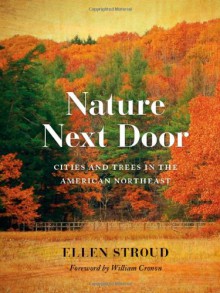Nature Next Door: Cities and Trees in the American Northeast
The once denuded northeastern United States is now a region of trees. Nature Next Door argues that the growth of cities, the construction of parks, the transformation of farming, the boom in tourism, and changes in the timber industry have together brought about a return of northeastern forests....
show more
The once denuded northeastern United States is now a region of trees. Nature Next Door argues that the growth of cities, the construction of parks, the transformation of farming, the boom in tourism, and changes in the timber industry have together brought about a return of northeastern forests. Although historians and historical actors alike have seen urban and rural areas as distinct, they are in fact intertwined, and the dichotomies of farm and forest, agriculture and industry, and nature and culture break down when the focus is on the history of northeastern woods. Cities, trees, mills, rivers, houses, and farms are all part of a single, transformed, regional landscape.In this examination of the cities and forests of the northeastern United States-with particular attention to the woods of Maine, New Hampshire, Pennsylvania, and Vermont-Ellen Stroud shows how urbanization processes fostered a period of recovery for forests, with cities not merely consumers of nature but creators as well. Interactions between city and hinterland in the twentieth-century Northeast created a new wildness of metropolitan nature: a reforested landscape intricately entangled with the region's cities and towns.Ellen Stroud is an environmental historian at Bryn Mawr College, where she is an associate professor in the Growth and Structure of Cities Department, and holds the Johanna Alderfer Harris and William H. Harris M.D. Chair in Environmental Studies."Stroud's idea that forests were shaped by human choice is an important complement to the standard story of forest succession in abandoned farmlands in the Northeast." -Richard Judd, University of Maine""The moral of Stroudʼs story has implications far beyond the American Northeast: the region has forests today because people made choices about them and then did the hard practical and political work of making those choices real. Such things do not happen by accident. They happen because people make them happen. That is as true today as it was a hundred years ago." -from the Foreword by William Cronon
show less
Format: hardcover
ISBN:
9780295992082 (0295992085)
Publish date: October 2012
Publisher: University of Washington Press
Pages no: 232
Edition language: English
Series: Weyerhaeuser Environmental Books

